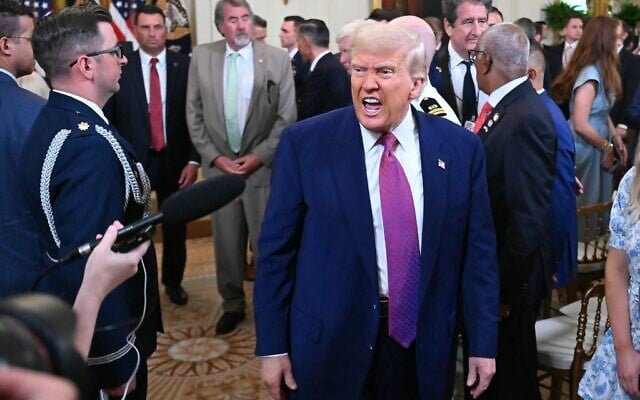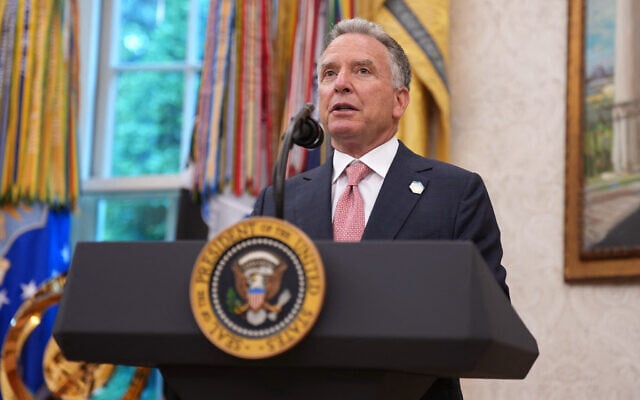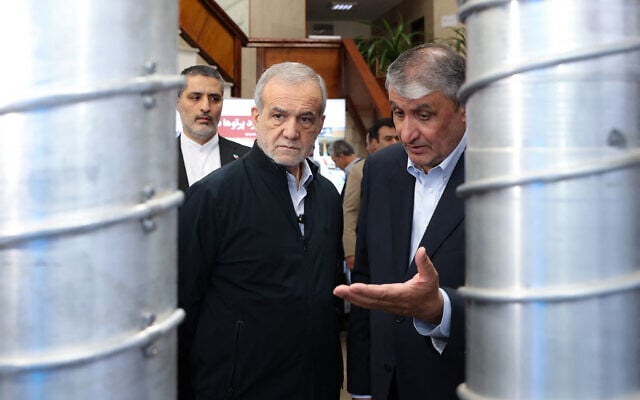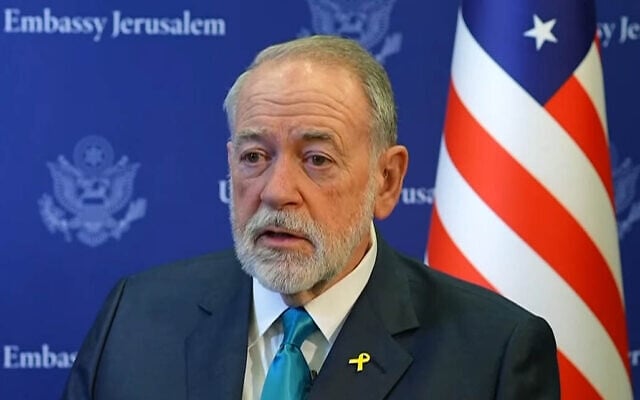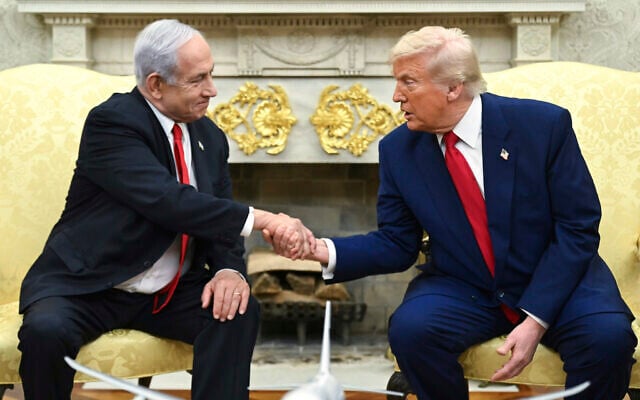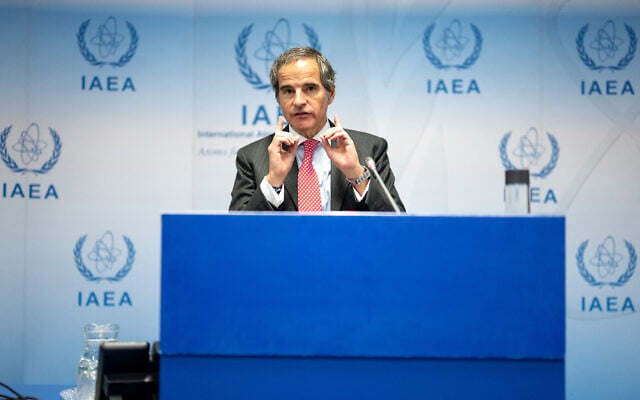


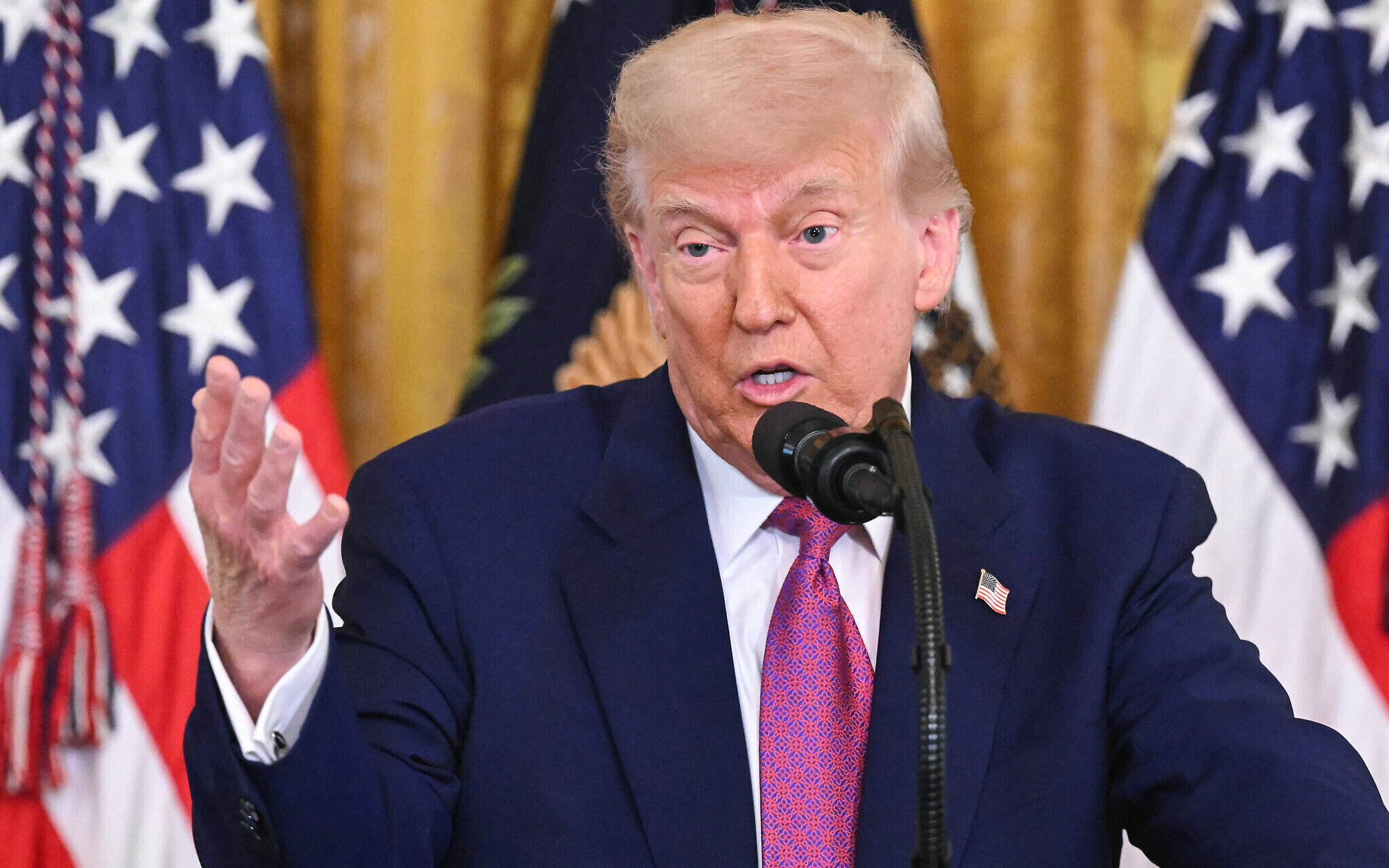
US President Donald Trump said Thursday that an Israeli strike on Iran’s nuclear sites “could very well happen” but advised against it, saying the possibility of a deal was “fairly close” if Tehran compromises on its atomic ambitions in ongoing talks with the US.
Trump was speaking after multiple reports that Israel was planning to strike Iran in the coming days and after the US took measures to drawdown on non-crucial staff and family members from its diplomatic missions and military bases across the Middle East.
“Iran cannot have a nuclear weapon. Other than that, I want them to be successful,” Trump told reporters at the White House. “We’ll trade with them, we’ll do whatever is necessary.
Trump acknowledged that Prime Minister Benjamin Netanyahu was considering an Iran strike, adding that such an attack could spark a “massive conflict.”
On whether Israel could attack Iran, Trump said: “I don’t want to say imminent, but it looks like it’s something that could very well happen.”
Speaking about the chances of reaching a deal with Iran, Trump said that “a pretty good agreement” was possible, but the chances could become more distant if the Israelis attacked Iran.
“I don’t want them going in, because I think it would blow it,” said Trump, when asked about his discussions with Netanyahu. “Might help it actually, but it also could blow it.”
Trump again described himself as a man of peace and said he would prefer a negotiated settlement with Iran.
“I’d love to avoid the conflict. Iran’s going to have to negotiate a little bit tougher — meaning they’re going to have to give us some things that they’re not willing to give us right now,” he said.
Despite the saber rattling and threats, Trump’s comments came as his envoy to Israel, Mike Huckabee, told the Ynet news site that Israel was unlikely to attack without a green light from the White House.
Also putting a damper on predictions of an imminent outbreak of hostilities, the IDF Home Front Command clarified Thursday evening that there were no changes in its emergency guidelines to the public, “following the rumors in the media and on [social] networks” and that the country was not on high alert.
Meanwhile, Channel 13 reported that IDF chief Lt. Gen. Eyal Zamir has insisted to Netanyahu that US support is necessary to attack Iran. Channel 13, citing a source with knowledge of the conversation, said that Air Force chief Maj. Gen. Tomer Bar shared Zamir’s view.
Also Thursday, Trump’s Middle East point man Steve Witkoff confirmed that a sixth round of talks with Iran would go ahead on Sunday in Oman.
Also Thursday, Italian Foreign Minister Antonio Tajani told reporters that his country does not indicate that there will be an Israeli attack on Iran in the near future.
“I don’t know if there will be an Israeli attack on Iran,” he said. “We have no signs, apart from what the Americans have done.”
Iranian President Masoud Pezeshkian struck a defiant tone amid the threats of a military strike, saying that his country would rebuild its nuclear facilities if they were destroyed in an attack, according to state media.
“It is not the case that if they destroy our facilities with bombs, everything will be lost — these capabilities exist in our minds, and therefore, whatever they do, we will rebuild again,” he said.
ABC News on Thursday cited “three sources familiar with the situation” as saying Israel was weighing an attack on Iran’s nuclear program in the coming days, and that they weren’t aware of a specific role the US would play in such a strike.
Similar reports appeared earlier in the day in major US outlets, including The New York Times, which cited a senior Iranian official as saying Iran could launch a counterstrike with hundreds of ballistic missiles.
The Kan public broadcaster cited an Iraqi political source as saying an Israeli strike could also lead Iraqi pro-Iran militias to attack US military bases in Iraq and in the Gulf states.
The US has authorized the departure of its nonessential embassy staff in those countries and restricted the travel of embassy staff within Israel, as Iran drilled its military amid the reports of planned Israeli action.
An Israeli official quoted by Channel 13 said Israel was awaiting the outcome of the US-Iran talks, and that “the situation could escalate very quickly.”
Tensions were further raised when the Islamic Republic vowed to raise the output of enriched uranium — the key sticking point in talks — after the top UN watchdog declared that Tehran was violating its nuclear safeguards obligations.
Iran, whose leaders are sworn to Israel’s destruction, has publicly denied seeking nuclear arms, but enriches uranium to a level of 60% — far above what is necessary for civilian use, and a short technical step away from weapons-grade.
Speaking to Ynet, Huckabee, the US ambassador to Israel, expressed doubt that Israel would attack Iran without a green light from Washington.
“I won’t be making that decision,” said the former governor and Baptist minister. “I just don’t in my mind see that that would be something that would likely happen because of the closeness of the relationship and the trust, and that’s the word I would emphasize, there is a trust between the US and Israel.”
Huckabee also cast doubt on reports that Trump had told Netanyahu this week not to attack Iran.
“I can’t say that the president gave any instructions,” said Huckabee. “I know they’ve had many conversations and they’ve discussed all aspects, but it would not be like the president to give instructions to the prime minister any more than it would be typical that the prime minister would give instructions to the president.”
Trump will not agree to a JCPOA 2.0 deal in nuclear talks with Iran, said Huckabee.
“He was the president who tore up the first one,” he said, referring to the 2015 nuclear deal spearheaded by then-US President Barack Obama. “I think the last thing he would have any interest in doing would be to embrace an Obama policy that was a total failure and one that he rejected as soon as he got in office.”
“The president made very clear that Iran is not going to have a nuclear weapon, that Iran isn’t going to have any enrichment, and I don’t know how much clearer he could get than he was,” Huckabee added.
He also says that reports that Trump is frustrated with Netanyahu are “simply not the case.”
“The relationship is, I believe, rock solid,” said Huckabee.
The interview was published as the International Atomic Energy Agency passed a resolution put forward by the US, France, UK, and Germany accusing Iran of “many failures” to maintain “full and timely cooperation” with the agency.
Gen. Dan Caine, chairman of the US Joint Chiefs of Staff, told US lawmakers that the international community appears to be thinking about what they will do about the IAEA’s latest resolution.
“The IAEA report is certainly troubling,” he said.
Tehran slammed the IAEA resolution — the first such declaration against Iran in two decades — and vowed to open a new uranium enrichment site “in a secure location.”
Responding to Iran’s statement, France’s foreign ministry accused Tehran of a “deliberate” escalation of nuclear tensions, and called on the Islamic Republic to return to the negotiating table.
Germany’s Foreign Minister Johann Wadephul said Iran should distance itself from any plans to acquire nuclear weapons.
“We expect Iran to credibly renounce any plans to acquire nuclear weapons,” Wadephul told journalists in Rome.
“Everyone wants to avoid any escalation. We will not stand by idly and watch Iran become nuclear-armed. That must be made clear in this situation,” said Wadephul, who was set to travel to the Middle East Thursday night and arrive in Israel on Sunday.
Emanuel Fabian contributed to this report.

